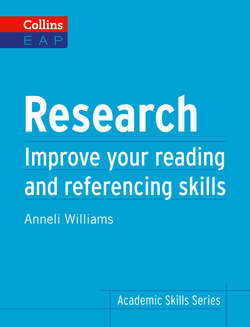Читать книгу Research: B2+ - Anneli Williams - Страница 12
The research process
ОглавлениеDoing research is a complex process, so it can be helpful to divide it into tasks. How you break down the process depends on your assignment, your preferred ways of working, and your strengths and weaknesses as a researcher.
Remember, in practice, doing research can be a ‘messy’ process. You may do some tasks, such as making an outline plan, more than once. Or, you may do some tasks at the same time, for example, you will probably continue reading while writing your first draft. However, in general, if you are new to research, you should probably aim to spend about 50% of the time available preparing and gathering information, and 50% writing up. As you gain experience, you can adjust the length of time you spend on each stage. However, students who spend more time preparing tend to score higher marks.
Exercise 1
Imagine you have 30 days to write a 3,000 word essay on a topic related to your course. The tasks you might do are listed in the table below. Tick the tasks that you think are important. For each task you have ticked, write approximately how much time you think it would be reasonable to spend on that task.
| Stage | Tasks | ✓ | Time |
| 1 Preparation | Think about the research topic and the instructions given. | ||
| Find out what information is available – do some background reading. | |||
| Devise a rough outline plan. | |||
| 2 Gathering information | Gather books and articles from the library or online. | ||
| Read and take notes. | |||
| 3 Writing up | Write a more detailed plan. | ||
| Write a first draft. | |||
| Revise your first draft. | |||
| Write a second draft. | |||
| Proofread your second draft and make corrections. |
When your essay has been marked and returned, set aside time to carefully consider the feedback given. This will give you useful information about how to approach your next essay. If you do not understand the feedback given, it is important to seek clarification and advice. Although lecturers cannot always provide one-to-one meetings, your university is likely to have study advisors who can help.
Tips
Think carefully about your essay question and why it is worth asking. This will help you choose a worthwhile focus for your paper.
Do some initial background reading. If you discover that there is not enough information to support your chosen essay focus, you can choose another essay title.
Write a rough outline plan before you start reading and taking notes. This will help you read efficiently and with a clear purpose.
